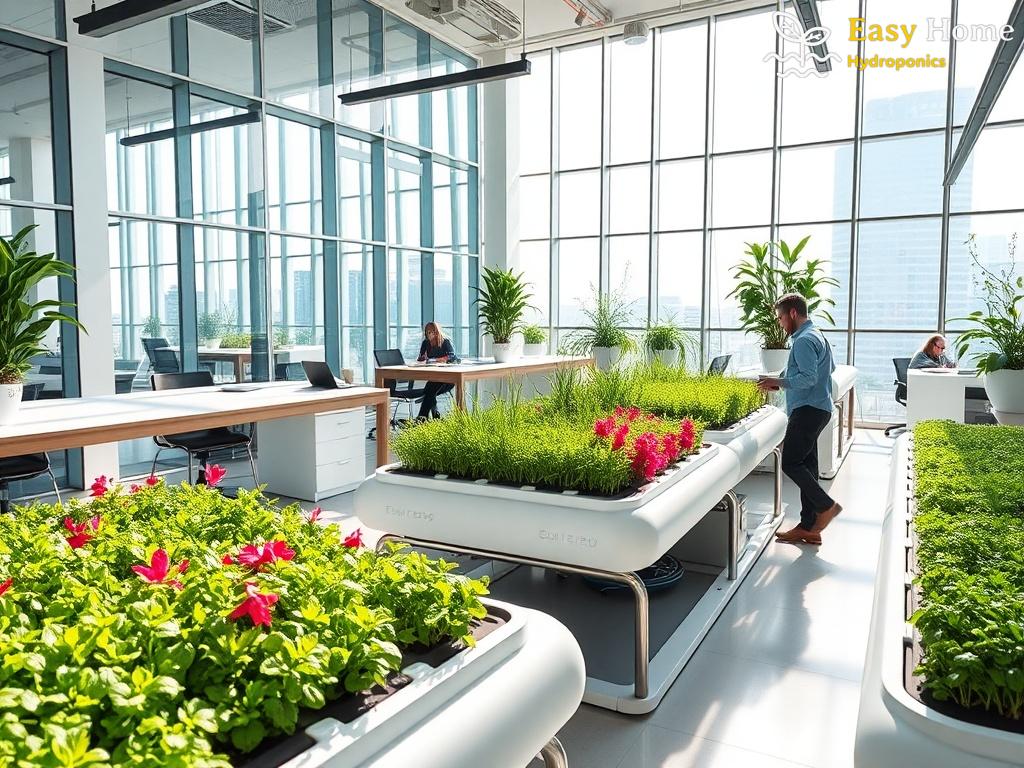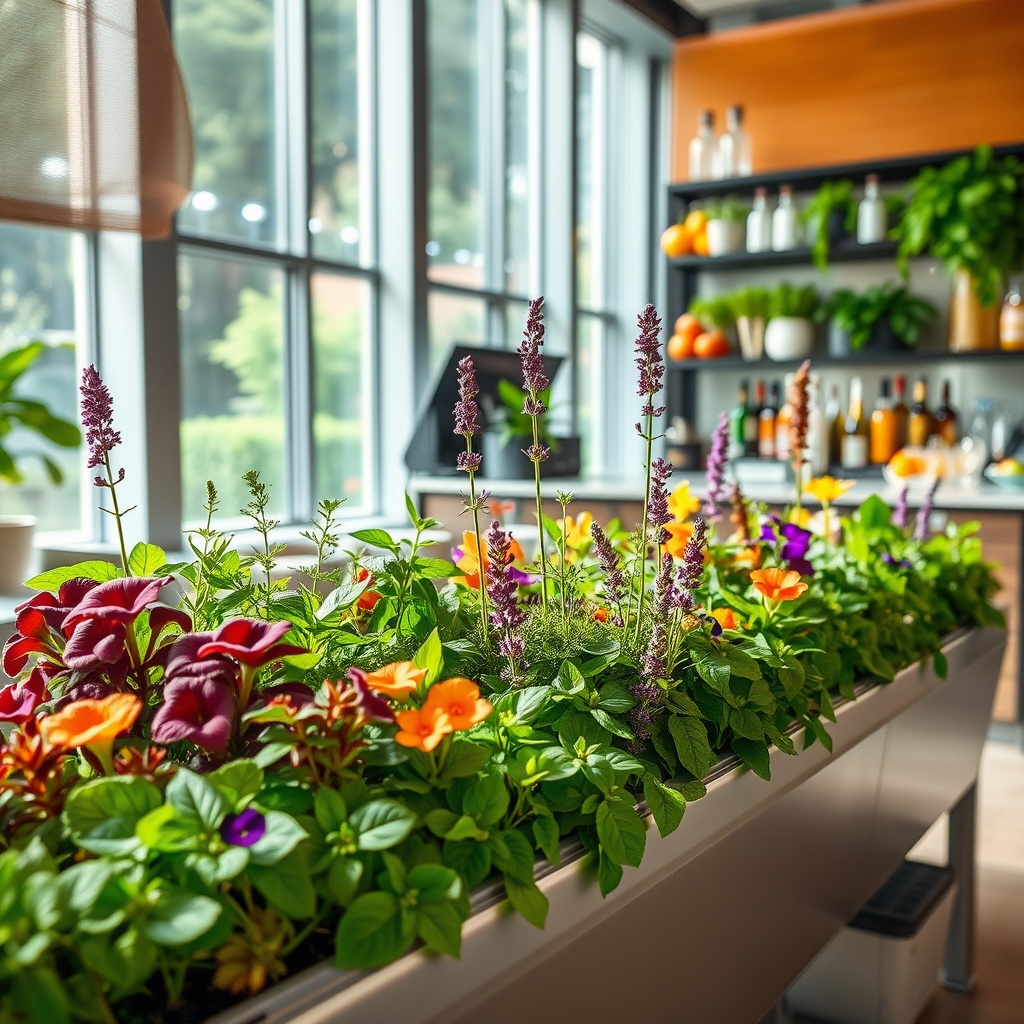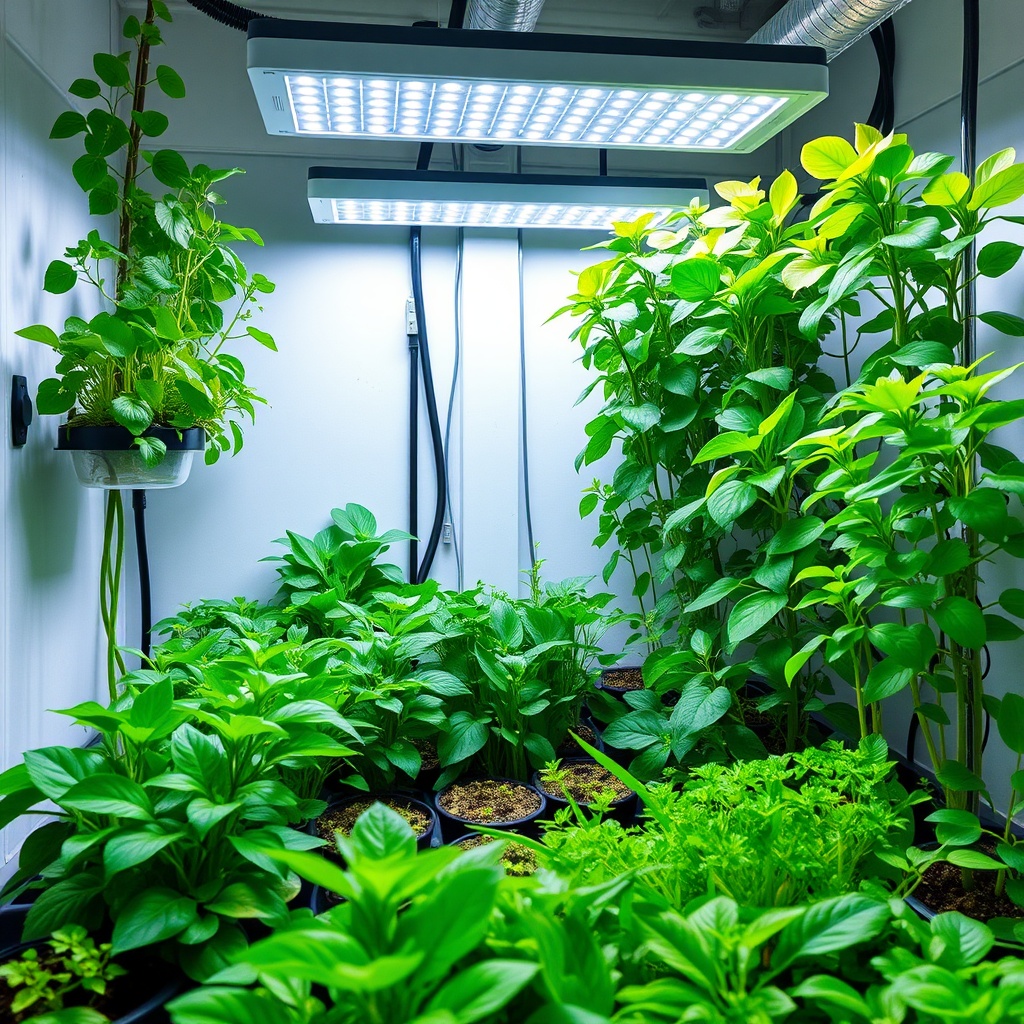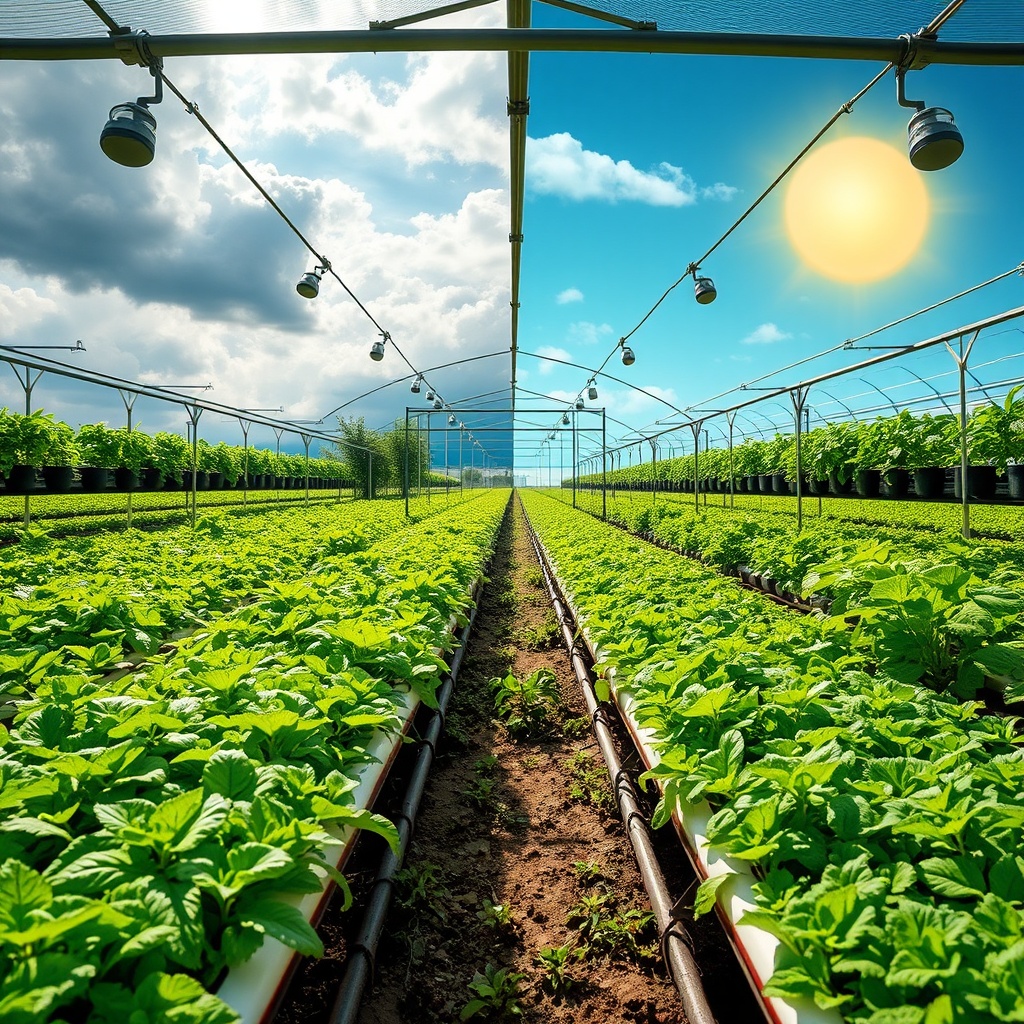Green Oasis: Transforming Office Spaces with Hydroponics
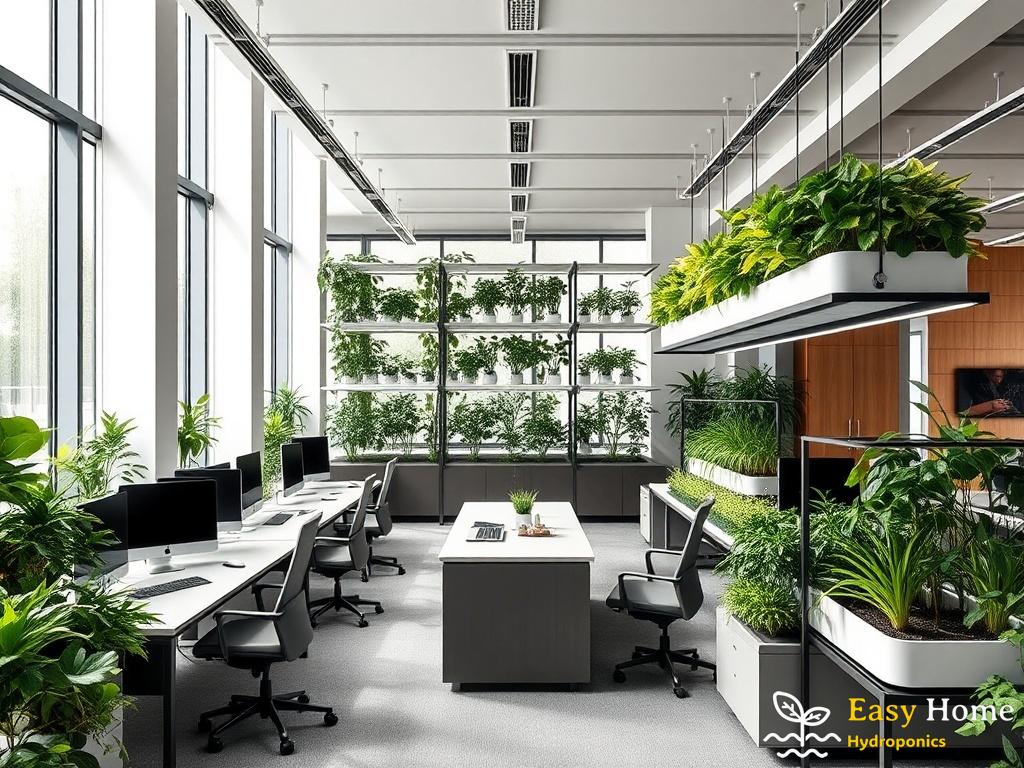
In the hustle and bustle of corporate life, the quest for a refreshing environment has led to an exciting trend: hydroponic gardening. Imagine a workplace filled not just with cubicles and computers, but also with vibrant greenery, fresh herbs, and even blooming flowers—all cultivated without soil. This innovative approach to gardening is revolutionizing office spaces, transforming them into serene green oases that promote well-being and productivity.
Hydroponics offers a plethora of benefits that extend beyond the visual appeal of plants in the office. Companies are increasingly recognizing the myriad advantages that these systems bring to their work environments. From fostering employee satisfaction to contributing to sustainability goals, hydroponic gardens are reshaping corporate culture.
- Enhanced Air Quality: Hydroponic plants naturally filter toxins and increase oxygen levels, improving the overall air quality.
- Stress Reduction: Studies show that greenery in the workplace reduces stress and enhances mood, leading to higher productivity.
- Fresh Produce: Employees enjoy access to fresh herbs and vegetables, promoting healthier eating habits.
- Team Building: Gardening projects encourage collaboration among employees, fostering a sense of community.
- Corporate Responsibility: Implementing hydroponics showcases a commitment to sustainability, appealing to eco-conscious consumers.
Transforming an office space into a hydroponic haven is more feasible than ever. With various systems available, companies can choose the one that best suits their needs and space limitations. Whether it’s a small countertop garden or a larger vertical system, the options are abundant.
Before diving into the world of hydroponics, consider the following steps to ensure a successful setup:
- Assess available space and light conditions.
- Choose the right hydroponic system (e.g., NFT, DWC, or aeroponics).
- Decide on the types of plants to grow based on the office climate.
- Incorporate the system into existing office design for aesthetic appeal.
- Encourage employee participation in the gardening process.
By embracing the hydroponic gardening trend, companies can cultivate not only plants but also a rejuvenating workplace atmosphere. It’s time for corporations to see their offices not just as places to work, but as green oases that nurture both employees and the planet.
Boosting Employee Wellness through Indoor Gardens
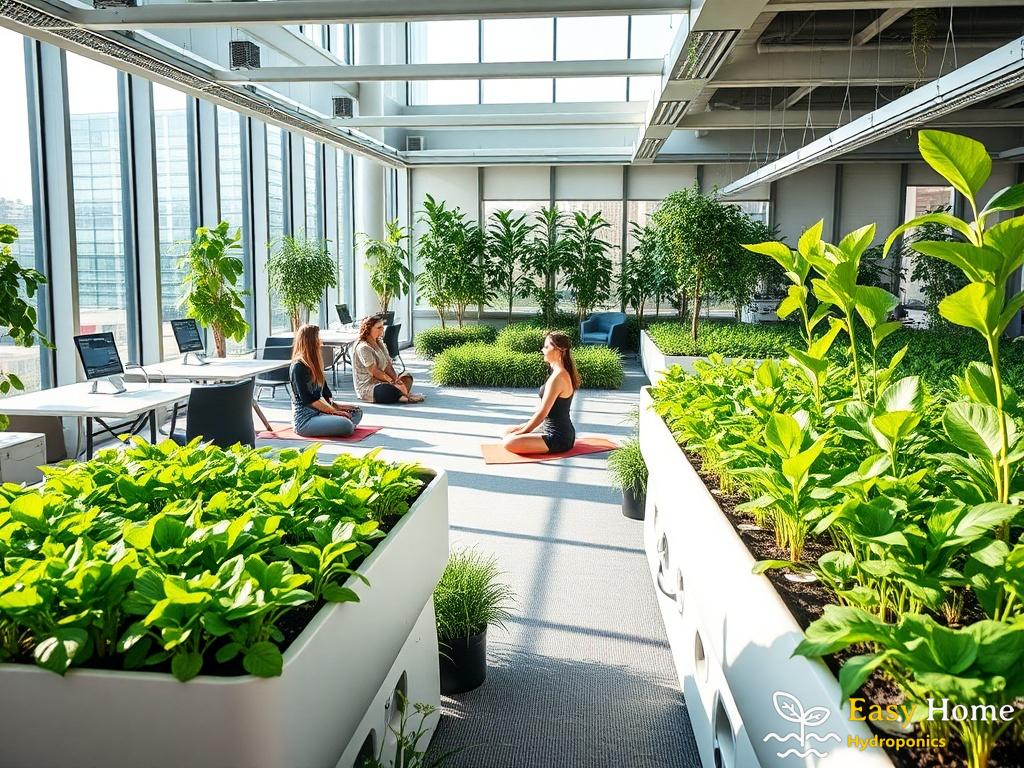
As corporate landscapes evolve, the integration of indoor gardens is becoming more than just a design trend; it is a catalyst for enhancing employee wellness. The emergence of hydroponic systems offers businesses a unique opportunity to foster environments that prioritize mental and physical health. By embedding greenery into office spaces, companies are not just beautifying their surroundings but are also investing in the holistic well-being of their workforce.
Research indicates that offices featuring indoor gardens significantly contribute to employee satisfaction. When workers interact with plants, they experience a sense of calm that counters the often chaotic nature of corporate life. This connection to nature, even in a minimalistic form, can lead to improved concentration and creativity, ultimately driving productivity. Embracing indoor gardens allows companies to create a nurturing environment that resonates with their values and mission.
One of the most compelling reasons to implement hydroponic systems within corporate settings is their profound psychological impact. Studies have shown that the presence of plants can lower levels of anxiety, reduce fatigue, and enhance overall mood. This is particularly crucial in high-pressure corporate atmospheres where stress is a common companion.
Moreover, indoor gardens serve as a reminder of nature, which can be particularly grounding for employees confined to their desks. The act of caring for plants can also provide a therapeutic outlet, allowing workers to take a break from their screens and engage in a more tactile, mindful activity. As a result, companies that incorporate hydroponics are not merely beautifying their spaces; they are actively promoting mental resilience among their employees.
Hydroponic gardening can also enhance collaboration and community spirit within the workplace. By involving employees in the gardening process, companies foster a sense of teamwork and shared responsibility. Team-building activities surrounding the care of these indoor gardens can break down hierarchical barriers and encourage communication across departments.
Furthermore, these gardens can become focal points for social interactions, providing employees with a refreshing space to unwind and connect with colleagues. As teams gather around their hydroponic systems, they not only enjoy the benefits of fresh produce but also strengthen interpersonal relationships. This collaborative atmosphere can lead to innovative ideas and a more cohesive workplace culture.
| Benefit | Description |
|---|---|
| Improved Air Quality | Plants filter toxins and increase oxygen levels, creating a healthier workspace. |
| Enhanced Productivity | Access to indoor greenery boosts concentration and creativity among employees. |
| Community Engagement | Gardening activities promote teamwork and communication, fostering a sense of belonging. |
In conclusion, the rise of hydroponic gardening in corporate environments is more than just a trend; it is a profound shift towards prioritizing employee wellness. By embracing the presence of indoor gardens, companies can cultivate a thriving atmosphere that nurtures both their workforce and the environment.
Sustainable Solutions: Hydroponics and Corporate Responsibility
As businesses navigate the complexities of modern-day challenges, the integration of hydroponic gardening emerges as a beacon of sustainability. This innovative approach not only benefits the health of employees but also aligns corporate practices with environmental stewardship. The rise of hydroponics in the workplace signifies a commitment to responsible practices, showcasing how corporations can thrive while nurturing the planet.
Hydroponic systems represent a revolutionary shift in how companies approach food production and resource management. By utilizing water-efficient techniques, these systems drastically reduce the environmental footprint associated with traditional agriculture. In corporate settings, this translates to a reduction in water usage, chemical fertilizers, and the transportation emissions typically associated with sourcing produce. Furthermore, companies that adopt hydroponics are not just enhancing their green credentials; they are also actively participating in the larger dialogue about sustainable food systems.
Implementing hydroponics in the workplace is more than just a practical trend; it reflects a broader corporate ethos of responsibility and care. Organizations that prioritize sustainable solutions often see a positive impact on their brand image, attracting eco-conscious consumers and talent alike. By showcasing their commitment to environmentally friendly practices, businesses can create a compelling narrative that resonates with stakeholders.
Consider the following compelling reasons why hydroponics is a key player in corporate sustainability:
- Reduced Waste: Hydroponic systems minimize waste by recycling water and nutrients, leading to a more efficient use of resources.
- Local Production: Growing food on-site reduces the need for transportation, which in turn lowers carbon emissions associated with food delivery.
- Engagement in Community Initiatives: Companies can leverage their hydroponic gardens to contribute to local food banks or community gardens, reinforcing their role as responsible corporate citizens.
The integration of hydroponic gardening sets the stage for a future where businesses thrive alongside sustainable practices. As environmental concerns grow globally, corporations that embrace such innovative agricultural methods position themselves as leaders in corporate responsibility. By fostering a culture that celebrates sustainability, organizations can not only enhance their operational efficiency but also inspire others to follow suit. In this way, hydroponics becomes a powerful tool for change, enabling companies to cultivate a greener, healthier future for all.
From Seed to Success: The Economic Benefits of Hydroponic Systems
The integration of hydroponic systems into corporate environments is not only a trend but a strategic move that can yield significant economic benefits. As organizations strive to enhance their productivity while minimizing their ecological footprint, hydroponics emerges as a viable solution that transcends mere aesthetics. By investing in these innovative systems, companies can reap financial rewards that extend beyond the immediate returns of fresh produce.
Cost-Effective Resource Management is one of the most compelling reasons to adopt hydroponic gardening within corporate settings. Traditional agriculture often comes with high overhead costs related to land procurement, soil management, and extensive water usage. In contrast, hydroponics allows businesses to produce food on-site, drastically reducing the need for transportation and the associated costs. This localized approach not only cuts expenses but also ensures fresher produce, enhancing the overall quality of offerings provided to employees and clients alike.
Moreover, the efficiency of hydroponic systems should not be underestimated. These systems use up to 90% less water compared to conventional farming methods, allowing companies to allocate their resources more judiciously. The reduction in water consumption not only leads to lower utility bills but also demonstrates a commitment to sustainability that can impress stakeholders and attract environmentally-conscious clients. Businesses that embrace hydroponics are effectively positioning themselves as pioneers in resource-efficient practices, setting a standard for others to follow.
Boosting Employee Engagement is another economic advantage tied to the implementation of hydroponic gardens. Companies that invest in creating green workspaces often witness higher employee morale and satisfaction. Engaging employees in the gardening process fosters a sense of ownership and pride, motivating them to contribute positively to the workplace culture. This elevated level of engagement can translate into improved retention rates and reduced turnover costs, ultimately benefiting the bottom line.
Furthermore, the allure of fresh, homegrown produce can significantly reduce the expenses associated with catering and employee meal programs. By offering fresh herbs and vegetables grown right in the office, businesses can not only enhance their dining options but also promote healthier eating habits among employees, which may lead to decreased health-related costs in the long run.
In summary, the economic benefits of hydroponic systems in corporate environments are both profound and multifaceted. From cost-effective resource management to enhanced employee engagement, the rise of hydroponic gardening is paving the way for a more sustainable and economically viable approach to modern business practices. As companies continue to realize the value of these systems, we can expect to see a flourishing trend that blurs the lines between productivity and environmental stewardship.
Innovative Tech: The Future of Hydroponic Gardening in Business
The fusion of technology and agriculture is ushering in a new era for hydroponic gardening in corporate environments. As businesses increasingly recognize the benefits of integrating green solutions into their operations, innovative tech is becoming a cornerstone of modern hydroponic systems. These advancements not only optimize plant growth but also streamline the management processes, making it easier for companies to maintain their green oases.
Smart Technology Integration has emerged as a game-changer in the realm of hydroponics. With the advent of sensors and IoT (Internet of Things) devices, businesses can monitor critical parameters such as nutrient levels, water quality, and light exposure from anywhere. This means that employees can manage their hydroponic systems remotely, ensuring that plants receive the ideal conditions for growth without the need for constant supervision. The convenience of automated systems allows companies to focus on their core operations while still reaping the benefits of fresh produce.
| Technology | Functionality | Benefits |
|---|---|---|
| IoT Sensors | Monitor environmental factors | Real-time data for optimal growth |
| Automated Nutrient Delivery | Precision feeding systems | Reduced waste and enhanced efficiency |
| LED Grow Lights | Energy-efficient lighting | Enhanced growth cycles and reduced energy costs |
The implementation of data analytics further enhances the capabilities of hydroponic systems. By analyzing growth patterns and environmental data, businesses can make informed decisions that lead to improved harvests. This predictive capability allows organizations to adapt swiftly to changing conditions, ensuring that they maximize yield while minimizing resource expenditure. As a result, companies can achieve greater sustainability and profitability, reinforcing their commitment to corporate responsibility.
The rise of vertical farming is another compelling aspect of hydroponic innovation in corporate environments. This method allows businesses to maximize space utilization by growing crops in stacked layers, making it ideal for urban settings where real estate is often at a premium. Moreover, vertical farms can be integrated into existing office spaces, creating a visually appealing and functional aspect of the workplace.
As technology continues to evolve, we can expect to see even more innovative solutions emerging in the hydroponics sector. For instance, the integration of artificial intelligence could lead to systems that learn from previous cycles of growth, adjusting conditions to optimize future yields. This kind of intelligent system would not only simplify the growing process but also significantly enhance productivity.
Furthermore, as businesses become more environmentally conscious, the demand for sustainable solutions will push the boundaries of hydroponic technology. From using renewable energy sources to developing biodegradable growing mediums, the future of hydroponics in the corporate landscape looks promising and ripe for exploration.

